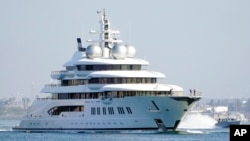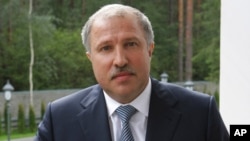When a superyacht worth $230 million pulled into the port of Everett, Washington, for repairs last month, it made a big splash in the city of 110,000 residents.
The 106-meter luxury behemoth known as the Amadea is currently in possession of the U.S. government, which alleges the yacht belongs to sanctioned Russian oligarch and politician Suleyman Kerimov, an ally of Russian President Vladimir Putin.
Looking out over the port, Everett resident Bob Templeton wondered who was paying for the superyacht's upkeep. “They ought to sell it to somebody and get a lot of money,” he told VOA with a laugh.
Easier said than done. Templeton’s offhand remark cuts to the core of a dilemma faced by the United States as it attempts to use sanctions to rein in Russian aggression against Ukraine.
The U.S. government has moved to take ownership of the Amadea through a legal procedure called civil forfeiture. The end goal is to sell the vessel and transfer the proceeds to Ukraine.
But another Russian businessman, who is not under sanctions, has challenged that move, claiming that he is the Amadea’s true owner.
As the courts try to sort out the yacht’s ownership, U.S. taxpayers are footing the bill: over half-a-million dollars a month for maintenance.
And the complex legal battle could drag on for a long time, increasing the costs for the U.S. and delaying any benefit to Ukraine from the yacht’s seizure, according to Stefan Cassella, a former U.S. federal prosecutor and expert in civil forfeiture.
“Nobody who is a sanctioned oligarch owns anything in his own name,” he said. “You have an entire zoo of third parties who claim they own the property.”
Kerimov did not respond to a request for comment. The U.S. Department of Justice declined to comment.
Kleptocapture win
In May 2022, just months after Russia launched its full-scale invasion of Ukraine, law enforcement in Fiji seized the Amadea at the request of the U.S. government.
That was a major victory for Task Force Kleptocapture, a unit of the U.S. Department of Justice created in the wake of the Russian invasion to enforce sanctions.
But completing the job has proved more complicated.
Since the 1980s, civil forfeiture has been the Department of Justice’s go-to tool for targeting drug dealers, the mafia and money laundering operations, according to David Smith, a former DOJ prosecutor who pioneered the practice.
It allows law enforcement to seize assets without convicting their owner of a crime. All that prosecutors must prove is that the assets were used in a crime, profited from a crime or resulted from criminal activity.
But when that crime is a sanctions violation, proving the asset is owned by a sanctioned person is critical.
Lawyers representing the company that owns Amadea have claimed the yacht actually belongs to Eduard Khudainatov, a former CEO of the Russian state oil company Rosneft, who is not subject to sanctions.
He and his legal team say the seizure is unlawful and based on a “misleading” FBI affidavit.
“Eduard Khudainatov is, and always has been, the rightful owner of the Amadea. The Biden Administration’s unconstitutional seizure of the vessel was based on demonstrable falsehoods that we will establish in court,” his spokesperson said in a statement to VOA. “The government asserts factual and legal theories that are divorced from forfeiture sanctions and money laundering laws, and unsupported by the cases interpreting those laws. This boondoggle is nothing more than political theater that has cost American taxpayers more than $20 million to date.”
The U.S. government disagrees, referring to Khudainatov as a “straw owner” of the Amadea.
According to prosecutors, Khudainatov is “supposedly the beneficial owner of at least eight yachts or yacht projects” — a fleet valued at over $1 billion. They include a yacht that prosecutors state is actually owned by Igor Sechin, the sanctioned incumbent CEO of Rosneft and a Putin ally.
Journalists have linked another one of the superyachts, the Scheherazade, to Putin himself. In May 2022, it was impounded in Italy.
While Khudainatov’s lawyers were unable to prevent the Amadea's transfer to the United States, they are currently fighting forfeiture in a New York court.
The DOJ states that Kerimov purchased the yacht in 2021, three years after he was added to sanctions list. Prosecutors allege that the oligarch or his proxies routed dollar transactions through U.S. financial institutions to maintain the Amadea, which would constitute a sanctions violation.
But proving Kerimov’s ownership — and disproving Khudainatov’s claim — is no simple task.
Assets like superyachts are often owned through a series of proxy owners, offshore companies and trusts. These entities are often registered in jurisdictions chosen for their secrecy.
Cassella, who has studied the case, says that Khudainatov’s legal team is dragging out proceedings, while the U.S. government is trying to compel him to answer questions and provide documentation that would prove he is not the Amadea's owner.
“This is civil forfeiture defense 101 for anybody who’s got an infinite amount of money to pay lawyers to oppose the forfeiture,” Cassella said.
Expensive process
While the legal battle goes forward, the U.S. government is paying to keep the Amadea running.
According to court filings, upkeep of the yacht costs roughly $600,000 a month. Insurance costs another $144,000 monthly, and there are other periodic expenses.
In a February filing, an official of the U.S. Marshals Service stated that the Amadea was also scheduled to undergo drydocking in March, which appears to have been delayed.
That procedure, which involves removing a vessel from the water to conduct repair work, was estimated to cost $5.6 million — although the government negotiated not to pay the other monthly costs during that period, the official noted.
In recent months, however, the U.S. government has taken steps to decrease the cost.
In February, it petitioned the court to sell the Amadea, citing the excessive costs of maintaining the yacht. Such a sale would effectively convert the yacht into cash, but not settle the ownership question.
In a filing opposing the sale, Khudainatov’s legal team stated that he had consistently offered to cover the cost of maintaining the Amadea.
On May 17, the U.S. government also submitted a motion to reject Khudainatov’s ownership claim, stating that he lacks standing to contest forfeiture.
If a judge agrees, that could allow the forfeiture to proceed.
Controversial, challenging strategy
While confiscating the assets of Russian oligarchs and top officials may not face fierce opposition from most Americans, civil forfeiture is controversial in the United States.
Advocacy organizations, both liberal and conservative, have criticized the practice, arguing that it allows law enforcement to seize private property without convicting the owner of a crime.
Smith, the former DOJ prosecutor, says the burden falls hardest on low-income Americans who struggle to pay for a lawyer.
This was one of the reasons why eight members of the U.S. House of Representatives in April 2022 voted against a bill calling for the Biden administration to seize sanctioned Russians’ assets to fund Ukraine.
Smith believes applying civil forfeiture to oligarchs is “arbitrary” and he is unsure whether the U.S. will be able to seize enough assets from oligarchs to make a meaningful difference for Ukraine.
“I would rather spend the money [subsidizing forfeiture investigations and proceedings] on other things than trying to forfeit these yachts,” he said. “And who knows how many will ultimately be forfeited.”
That concern is not unfounded. The Kleptocapture Task Force is working to forfeit or restrain around $700 million, but, so far, the United States has been able to transfer forfeited assets to Ukraine in only a handful of cases.
In May 2023, U.S. Attorney General Merrick Garland authorized sending $5.4 million to Ukraine that the U.S. had seized from sanctioned Russian oligarch Konstantin Malofeyev. It represented the first such transfer of forfeited funds to Ukraine.
Later that year, the U.S. transferred over a million rounds of ammunition to Ukraine after seizing them en route from Iran to Yemen.
In February 2024, the U.S. government, after breaking up a scheme to illegally procure military-grade technology for Russia, transferred $500,000 in forfeited Russian funds to Estonia to provide aid to Ukraine.
In April, the U.S. transferred another shipment of weapons seized from Iran to Ukraine.
Those transfers put funds and ammunition in the hands of the Ukrainian government, but they were also of a significantly lower value than the Amadea.
Bigger cases involving oligarch assets may prove more difficult.
“It wouldn’t surprise me if it took 10 years to resolve some of these cases,” said former prosecutor Cassella.
Natasha Mozgovaya reported from Everett, Washington. Matthew Kupfer and Oleksii Kovalenko reported from Washington, D.C.








